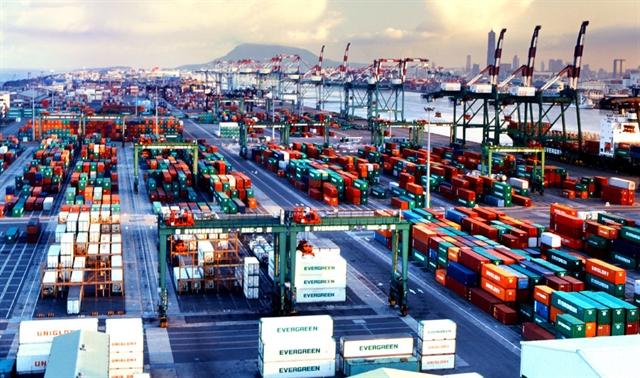 Economy
Economy

 |
| Việt Nam builds Provincial Logistics Competitiveness Index (LCI) to promote development of logistics services. Photo baochinhphu.vn |
HÀ NỘI — The launch of the Vietnam Provincial Logistics Competitiveness Index (LCI) is expected to help reduce logistics costs, support production and export development, and attract foreign investment more effectively in the future, said Lê Duy Hiệp, the Việt Nam Logistics Business Association (VLA) chairman.
According to the VLA, the LCI Index is an index that evaluates the development speed, quality, infrastructure, and policies of municipal and provincial authorities for logistics service businesses in Việt Nam.
Trần Phương Trà, director of the Economic Policy Network at AVSE Global, said that provinces and cities lack systems in logistics infrastructure to link among localities effectively.
Meanwhile, logistics is a very important factor to help agricultural, industrial and service value chains in Việt Nam develop.
In addition, according to this expert, in the planning of provinces and cities, the role of the logistics industry has not been highlighted enough as a factor connecting and supporting economic sectors, and ensuring the transport of goods.
The reason for this is probably at the organisation stage. This is one sector that needs close coordination among production sectors, such as agriculture and industry, with infrastructure, transport and construction sectors, Trà said.
In addition, provinces and cities in Việt Nam are always up to date on the trends of international logistics, such as Closed Loop Supply Chain and circular economy.
At the kick-off ceremony of the Vietnam Provincial Logistics Competitiveness Index (LCI) Project 2022 on August 11, she emphasised that logistics is the "heart" connecting all stages in the value chain, from production, transportation and storage to the supplier and the end user. Without logistics, the value chain will operate ineffectively.
For example, organising logistics activities at the municipal or provincial level needs to pay attention to strategy and orientation. That means having specific activities and goals to connect related industries. This also requires local management agencies to organise effectively the logistics stages.
“Therefore, the implementation of the LCI project is very useful. This will encourage localities to set up logistics development strategies well,” Trà was quoted by the Vietnam Economic Times as saying.
The LCI Index will be used to evaluate policies with local authorities to improve and develop the logistics service industry.
This index is implemented by VLA in collaboration with Việt Nam Chamber of Commerce and Industry (VCCI)'s and research units, Dream Incubator (DI) and the Việt Nam Logistics Research and Development Institute (VLI).
The statistics and assessments in the index will be important for domestic and foreign businesses in choosing locations and expanding business.
For the provincial LCI Index, experts said that the important factors of this index include organisation, infrastructure, technology in logistics and supply chain management. They are also macroeconomic conditions, skills, product market, labour market, financial system, market scale, dynamism in the business environment, and innovation.
The competitiveness index of Việt Nam’s logistics ranks 77th in the world. If each locality has good logistics activities, it will certainly raise Việt Nam's logistics competitiveness rank in the future.
Regarding the logistics infrastructure in localities, experts said that they need to improve roads, the efficiency of ships, ports and air services, and even power supply systems for logistics.
One more important factor in the provincial LCI is the human factor. The localities have a lack of skilled human resources that can meet the requirements of connecting parts in a value chain. VNS

.jpg)


